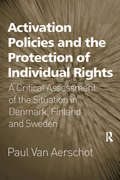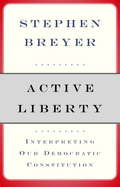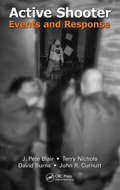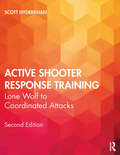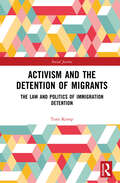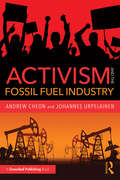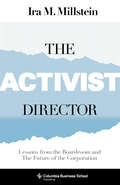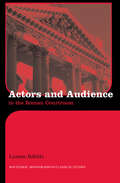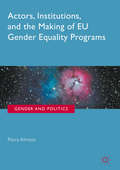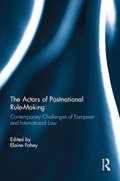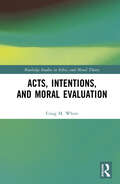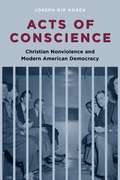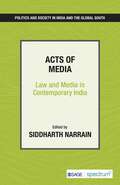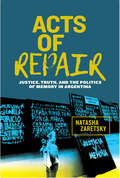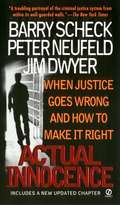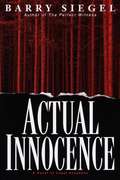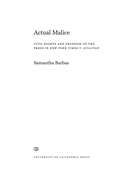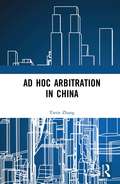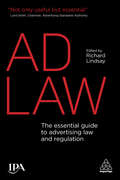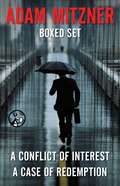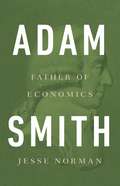- Table View
- List View
Activation Policies and the Protection of Individual Rights: A Critical Assessment of the Situation in Denmark, Finland and Sweden
by Paul Van AerschotIn Denmark, Finland and Sweden the evolution of administrative law, including social welfare law, has been marked by a shift towards a stronger protection of the recipient's individual rights. The adoption of activation policies targeting recipients of social assistance has highlighted the tensions between decision-making concerning the implementation of these policies and the legislative efforts to promote the realisation of individual rights in the field of social welfare. An examination of the legislation in question and its implementation conditions shows that the realisation of individual rights is subordinated to the pursuit of organisational and other objectives. The findings of the study are used to formulate proposals for the promotion of individual rights based on the Nordic egalitarian model of citizenship. This critical assessment of activation policies should be of broad international appeal. It will be of interest to researchers in social policy, as well as those concerned with protection of rights.
Active Citizenship and Disability
by Andrew Power Janet E. Lord Allison S. DeFranco Andrew Power Janet E. Lord Allison S. DefrancoThis book provides an international comparative study of the implementation of disability rights law and policy focused on the emerging principles of self-determination and personalisation. It explores how these principles have been enshrined in the United Nations Convention on the Rights of Persons with Disabilities and how different jurisdictions have implemented them to enable meaningful engagement and participation by persons with disabilities in society. The philosophy of 'active citizenship' underpinning the Convention - that all citizens should (be able to) actively participate in the community - provides the core focal point of this book, which grounds its analysis in exploring how this goal has been imagined and implemented across a range of countries. The case studies examine how different jurisdictions have reformed disability law and policy and reconfigured how support is administered and funded to ensure maximum choice and independence is accorded to people with disabilities.
Active Liberty
by Stephen BreyerA brilliant new approach to the Constitution and courts of the United States by Supreme Court Justice Stephen Breyer.For Justice Breyer, the Constitution's primary role is to preserve and encourage what he calls "active liberty": citizen participation in shaping government and its laws. As this book argues, promoting active liberty requires judicial modesty and deference to Congress; it also means recognizing the changing needs and demands of the populace. Indeed, the Constitution's lasting brilliance is that its principles may be adapted to cope with unanticipated situations, and Breyer makes a powerful case against treating it as a static guide intended for a world that is dead and gone. Using contemporary examples from federalism to privacy to affirmative action, this is a vital contribution to the ongoing debate over the role and power of our courts.From the Trade Paperback edition.
Active Liberty
by Stephen BreyerWhat role should courts play in a modern democracy? How should fundamental provisions of a democratic constitution be interpreted? These questions have divided constitutional theorists and those responsible for interpreting and applying constitutional law including, notoriously, thecurrent U. S. Supreme Court. Justice Breyer is the most prominent liberal voice in the Supreme Court, this book distils his experience of interpreting the U. S. constitution and outlines a general liberal theory of the role of constitutional courts. Breyer argues that the primary role of a democratic constitution is to preserve and encourage 'Active Liberty': citizen participation in shaping government and its laws. The book argues that promoting active liberty requires judicial modesty and deference to legislative bodies; it also requiresthe recognition of the changing needs and demands of the populace. Breyer makes a powerful case against treating constitutions as a static guide for a world that has passed into history. Throughout the book, active liberty is employed as a foundational concept to illuminate the interpretation of key constitutional questions, and recent Supreme Court controversies, such as the scope of free speech and racial equality protection. For this revised, international edition of the book, Justice Breyer extends his discussion of democratic theory to examine topical questions in European constitutional law, including the legitimacy of the European Union, religious freedom under the European Convention on Human Rights.
Active Shooter Events and Response
by John P. Blair Terry Nichols David Burns John R. CurnuttThe Columbine tragedy on April 20, 1999 began a new era in law enforcement as it became apparent that the police response to such mass shootings must be drastically altered. By the time the Sandy Hook Elementary School shooting occurred on December 14, 2012, outdated police response strategies had been replaced with new, aggressive tactics used by
Active Shooter Response Training: Lone Wolf to Coordinated Attacks
by Scott HyderkhanActive Shooter Response Training: Lone Wolf to Coordinated Attack, Second Edition, provides expanded and updated training for police and security officers who must respond to an active shooter situation. This manual addresses all facets of preparation and response, from complex logistical organization to collective and individual tactics, as well as special units or special skills tasks. Based on time-tested military training doctrine, the program described here offers a template for agencies of all sizes to offer training that effectively utilizes officers’ available time. Hyderkhan and his expert contributors cover all aspects of the active shooter response (ASR) mission, from risk analysis to logistical planning for mass casualty events. He also addresses medical care and evacuation, reunification procedures, and post-incident investigation. Active Shooter Response Training, Second Edition, provides the tools needed to prevent or mitigate tragedy in our religious congregations, schools, and public places. The book includes a voucher code for a 50% discount off of the companion online library of training videos This book is directed to law enforcement agencies, private security teams, training organizations, police leaders, and individual officers and trainers, in the US and globally. It also has potential as recommended reading in policing courses at the community college and university level.
Activism and the Detention of Migrants: The Law and Politics of Immigration Detention (Social Justice)
by Tom KempThis book is an empirically grounded, critical engagement with the politics of immigration detention and deportation. Focusing on the constitutive tensions and political generativity within the activist practices of the anti-detention movement, this book examines the distinction between representational and post-representational political sensibilities. Representational politics centres on representing the interests of disenfranchised people to the state and public and operates primarily within the regime of immigration law. Post-representational politics focuses on working collaboratively with those in detention, to resist and challenge the deportation system. Since representational politics is the predominant political imaginary of migrant rights campaigning, the book focuses on illustrating and evaluating the role of post-representational politics. The book argues that the concept of post-representational politics is important for understanding and participating in radical opposition to state racism. This argument rests on the expanded possibilities it motivates of engaging with and resisting institutions that are poised to co-opt resistance; the attention it fosters to the situated power dynamics of political activities that collaborate with imprisoned people; and its sensitivity to the politically and conceptually generative capacities of everyday, embodied practices of resistance. To make this argument, this book employs innovative methodology to illuminate and engage with the practice-based thinking of activist movements about the concepts of solidarity, hospitality, witnessing and accountability. This book will be of interest to scholars and activists with interests in socio-legal studies of immigration and refugee law, as well as others in social movement studies, critical legal studies, border criminology and critical theory.
Activism and the Fossil Fuel Industry
by Andrew Cheon Johannes UrpelainenIn less than a decade, activism against the fossil fuel industry has exploded across the globe. While environmentalists used to focus on legislative goals, such as carbon emissions trading or renewable energy policies, today the most prominent activists directly attack the fossil fuel industry. This timely book offers a comprehensive evaluation of different types of activism, the success and impact of campaigns and activities, and suggestions as to ways forward. This book is the first systematic treatment of the anti-fossil fuel movement in the United States. An accessible and readable text, it is an essential reference for scholars, policymakers, activists, and citizens interested in climate change, fossil fuels, and environmental sustainability. The entire book or chapters from it can be used as required or supplementary material in various courses at the undergraduate and graduate level. As the book is not technically challenging but contains a comprehensive review of climate change, fossil fuels, and the literature on environmental activism, it can be used as an accessible introduction to the anti-fossil fuel campaign across disciplines.
The Activist Director: Lessons from the Boardroom and the Future of the Corporation (Columbia Business School Publishing Ser.)
by Ira MillsteinSome of the worst corporate meltdowns over the past sixty years can be traced to passive directors who favored operational shortcuts over quality growth strategies. Thinking primarily about placating institutional investors, selective stockholders, proxy advisors, and corporate management, these inattentive and deferential board members have relied on short-term share price increases to sustain their companies long term. Driven by a desire for prosperity, not posterity, these actions can doom any company. In The Activist Director, attorney Ira M. Millstein looks back at fifty years of counseling companies, nonprofits, and governments to actively govern their corporations and constituencies. From the threat of bankruptcy and the ConEd blackout of 1970s New York City, to the meltdown of Drexel Burnham Lambert in the late 1980s, to the turnaround of General Motors in the mid-1990s, Millstein takes readers into the boardrooms of several of the greatest catastrophes and success stories of America's best-known corporations. His solution lies at the top: a new breed of activist directors who partner with management and reject short-term outlooks, plan a future based on growth and innovation, and take responsibility for corporate organization, strategy, and efficiency. What questions should we ask of potential board members and how do we know they'll be active? Millstein offers pragmatic suggestions for recruiting activist directors to the boardroom to secure the future of the corporation.
Un Acto Patriota
by Kenneth EadeLa muerte, la ley, en este orden en la Bahía de Guantánamo. Cuando un ciudadano americano nacionalizado aparece desaparecido en Irak, Brent Marks lucha contra el gobierno Goliat de EE.UU. con su propia Constitución. El contador de Santa Bárbara Ahmed Khury responde a la petición de su hermano, Sabeen, un presunto lavador de dinero en Irak. Antes de que Ahmed se dé cuenta de lo que le ha pasado, está en el campo de detención de la bahía de Guantánamo, siendo sometido a tortura para extraer información que no tiene. El drama fuera de la sala del tribunal explota, y cuando el asesinato, la corrupción y el encubrimiento entran en escena, nadie, incluyendo a Brent, está a salvo.
Actors and Audience in the Roman Courtroom (Routledge Monographs In Classical Studies)
by Leanna BablitzWhat would you see if you attended a trial in a courtroom in the early Roman empire? What was the behaviour of litigants, advocates, judges and audience? It was customary for Roman individuals out of general interest to attend the various courts held in public places in the city centre and as such the Roman courts held an important position in the Roman community on a sociological level as well as a letigious one. This book considers many aspects of Roman courts in the first two centuries AD, both civil and criminal, and illuminates the interaction of Romans of every social group. Actors and Audience in the Roman Courtroom is an essential resource for courses on Roman social history and Roman law as a historical phenomenon.
Actors, Institutions, and the Making of EU Gender Equality Programs (Gender and Politics)
by Petra AhrensThis book is an actor-centred sociological study of the EU-level processes that produce gender equality policy. Based on interviews and documentary analysis, the study unpacks the process of the "Roadmap for Equality between Women and Men 2006-2010" to explain the different roles of actors in the making of EU gender equality policies. By analysing policy processes inside institutions and among institutions, the study focuses on the internal working logics in and between EU-level institutions. It highlights the shifting spaces, openings, and constraints for the development of gender equality policies. Concentrating on EU policy programmes helps shed light on the invisible aspects of EU gender equality policy-making and how this process changed regarding actors, structure and content in the late 2000s. This book will be of interest to students and scholars in the fields of EU politics, gender politics, and public policy, as well as to institutional and non-governmental actors in the area of gender politics in Europe and the working of EU politics.
The Actors of Postnational Rule-Making: Contemporary challenges of European and International Law
by Elaine FaheyDespite its centrality to academic discussions of power and influence, there is little consensus in legal scholarship over what constitutes an actor in rule-making. This book explores the range of actors involved in rule-making within European Union law and Public International law, and focuses especially on actors that are often overlooked by formative and doctrinal approaches. Drawing together contributions from many scholars in various fields the book examines such issues as the accommodation of new actors in the process of postnational rule-making, the visibility or covertness of actors within the process, and the role of social acceptance and legitimacy in postnational rule-making. In its endeavour to render and examine the work and effect of actors often side-lined in the study of postnational rule-making, this book will be of great use and interest to students and scholars of EU law, international law and socio-legal studies.
Acts, Intentions, and Moral Evaluation (Routledge Studies in Ethics and Moral Theory)
by Craig M. WhiteThis book argues that the moral quality of an act comes from the agent’s inner states. By arguing for the indispensable relevance of intention in the moral evaluation of acts, the book moves against a mainstream, "objective" approach in normative ethics. It is commonly held that the intentions, knowledge, and volition of agents are irrelevant to the moral permissibility of their acts. This book stresses that the capacities of agency, rather than simply the label "agent," must be engaged during an act if its moral evaluation is to be coherent. The author begins with an ontological argument that an act is a motion or a causing of change in something else. He argues that the source of an act’s moral meaning is in the agent: specifically, what the agent, if aware of relevant facts around her, aims to accomplish. He then moves to a series of critical chapters that consider arguments for mainstream approaches to act evaluation, including Thomson’s dismissal of the agent knowledge and volition requirements, Scanlon’s arguments for a derivative relevance of intentions to permissibility, Frowe’s "causal roles" of agents in the moral evaluation of acts, and Bennett’s explicit defense of the objective approach. The book concludes by offering the author’s preferred replacement for the objective approach, an Aristotelian-Thomist view of acts. Acts, Intentions, and Moral Evaluation will be of interest to scholars and advanced students working in ethics, just war theory, the ethics of self-defense, and philosophy of action.
Acts of Conscience: Christian Nonviolence and Modern American Democracy (Columbia Studies in Contemporary American History)
by Joseph Kip KosekIn response to the massive bloodshed that defined the twentieth century, American religious radicals developed a modern form of nonviolent protest, one that combined Christian principles with new uses of mass media. Greatly influenced by the ideas of Mohandas Gandhi, these "acts of conscience" included sit-ins, boycotts, labor strikes, and conscientious objection to war. Beginning with World War I and ending with the ascendance of Martin Luther King Jr., Joseph Kip Kosek traces the impact of A. J. Muste, Richard Gregg, and other radical Christian pacifists on American democratic theory and practice. These dissenters found little hope in the secular ideologies of Wilsonian Progressivism, revolutionary Marxism, and Cold War liberalism, all of which embraced organized killing at one time or another. The example of Jesus, they believed, demonstrated the immorality and futility of such violence under any circumstance and for any cause. Yet the theories of Christian nonviolence are anything but fixed. For decades, followers have actively reinterpreted the nonviolent tradition, keeping pace with developments in politics, technology, and culture. Tracing the rise of militant nonviolence across a century of industrial conflict, imperialism, racial terror, and international warfare, Kosek recovers radical Christians' remarkable stance against the use of deadly force, even during World War II and other seemingly just causes. His research sheds new light on an interracial and transnational movement that posed a fundamental, and still relevant, challenge to the American political and religious mainstream.
Acts of Media: Law and Media in Contemporary India
by Siddharth NarrainActs of Media seeks to consolidate a field of multidisciplinary work around media technologies that intersects with legal scholarship. This volume brings together contributions from leading academics, lawyers, researchers and policy experts about contemporary India and Sri Lanka. The approaches to law and media taken in this volume challenge us to think outside of traditional disciplinary descriptions. Rather than approaching the law as being outside of, and constantly catching up with the media, the contributors of this book view law and media as being deeply intertwined. The chapters in this volume address the relationship between law and media through different entry points---disputes over media and information systems shaping law, theories of law that incorporate media forms, and law and media co-producing trials. The multidisciplinary nature of this book has facilitated a rich and productive conversation among legal scholars, researchers and lawyers from disciplines such as constitutional law, law and technology, media and cinema studies, legal anthropology and political science.
Acts of Repair: Justice, Truth, and the Politics of Memory in Argentina (Genocide, Political Violence, Human Rights)
by Natasha ZaretskyActs of Repair explores how ordinary people grapple with political violence in Argentina, a nation home to survivors of multiple genocides and periods of violence, including the Holocaust, the political repression of the 1976-1983 dictatorship, and the 1994 AMIA bombing. Despite efforts for accountability, the terrain of justice has been uneven and, in many cases, impunity remains. How can citizens respond to such ongoing trauma? Within frameworks of transitional justice, what does this tell us about the possibility of recovery and repair? Turning to the lived experience of survivors and family members of victims of genocide and violence, Natasha Zaretsky argues for the ongoing significance of cultural memory as a response to trauma and injustice, as revealed through testimonies and public protests. Even if such repair may be inevitably liminal and incomplete, their acts seeking such repair also yield spaces for transformation and agency critical to personal and political recovery. Author website (www.natashazaretsky.com)
Actual Innocence: When Justice Goes Wrong and How to Make it Right
by Barry Scheck Peter Neufeld Jim DwyerThis book presents an account of lives ruined by miscarriages of justice and has also generated a storm of media attention, public outrage, and a nationwide debate on the criminal justice system.
Actual Innocence
by Barry SiegelCalifornia lawyer Greg Monarch was in no mood for visitors. But it's not every day a federal judge comes knocking at his door, especially with a curious request: to review the final appeal of a murderer on Death Row who personally asked for Greg's assistance. Tired of defending killers, Greg has every intention of turning it down--until he discovers the prisoner is a former lover he hasn't seen in two decades: the fiery, impetuous Sarah Trant.
Actual Malice: Civil Rights and Freedom of the Press in New York Times v. Sullivan
by Samantha BarbasA deeply researched legal drama that documents this landmark First Amendment ruling—one that is more critical and controversial than ever. Actual Malice tells the full story of New York Times v. Sullivan, the dramatic case that grew out of segregationists' attempts to quash reporting on the civil rights movement. In its landmark 1964 decision, the Supreme Court held that a public official must prove "actual malice" or reckless disregard of the truth to win a libel lawsuit, providing critical protections for free speech and freedom of the press. Drawing on previously unexplored sources, including the archives of the New York Times Company and civil rights leaders, Samantha Barbas tracks the saga behind one of the most important First Amendment rulings in history. She situates the case within the turbulent 1960s and the history of the press, alongside striking portraits of the lawyers, officials, judges, activists, editors, and journalists who brought and defended the case. As the Sullivan doctrine faces growing controversy, Actual Malice reminds us of the stakes of the case that shaped American reporting and public discourse as we know it.
Ad Hoc Arbitration in China
by Tietie ZhangArbitration is the dominant method in the world for resolving international commercial disputes. As compared with institutional arbitration, ad hoc arbitration has many advantages that make it a preferred way to resolve commercial disputes on many occasions. The Arbitration Law of the People’s Republic of China, however, requires that parties appoint an arbitration institution in their arbitration agreement; otherwise an ad hoc arbitration agreement is invalid. This rule seems to preclude ad hoc arbitration under Chinese law and threatens the validity of many arbitration agreements that are imperfectly drafted. Fortunately, however, this does not mean Chinese courts will never enforce an ad hoc arbitration agreement or an ad hoc arbitration award. This book informs parties and practitioners of potential pitfalls related to ad hoc arbitration in China and offers practical guidance. It also conducts a comparative study of the history of arbitration in the Western world and in China, to identify the reasons for this hostility to ad hoc arbitration and calls for changes to this requirement under Chinese law.
Ad Law: The Essential Guide to Advertising Law and Regulation
by Richard LindsayThe implications of breaching UK advertising laws or regulations can be both costly and time-consuming. If a campaign is found to be potentially offensive, harmful or misleading, for example, all of the creative work and strategic planning may have to be withdrawn or changed. That is not only expensive but likely to attract very negative publicity to the brand. Ad Law is the essential practical guide to the law and regulation of advertising and marketing communications, offering level-headed advice on everyday questions encountered when designing and running promotional campaigns. Spanning legal issues such as intellectual property, privacy and defamation as well as the self-regulatory framework in the UK to which advertisers must adhere, Ad Law expertly leads readers through the most applicable laws and regulations, explains how to comply and points out common pitfalls. In addition, guidance on the practical side of the business of advertising is included, discussing the new industry-standard client/agency agreement, for example. Ad Law contains guidance based on real-world experiences from media and advertising lawyers and the IPA legal team, making it the ideal companion for advertising and marketing professionals as well as lawyers in the sector.
Adam Mitzner Boxed Set: A Conflict of Interest and A Case of Redemption
by Adam MitznerFollow the riveting stories of two New York City defense lawyers, back-to-back, in this ebook-only package combining Adam Mitzner's acclaimed legal thrillers A Conflict of Interest and A Case of Redemption.A Conflict of Interest Criminal defense attorney Alex Miller has the life he's always dreamed of: a loving and patient wife, a beautiful daughter, and a career as the youngest partner in one of the most powerful law firms in New York City. At his father's funeral, Alex meets a wealthy and mysterious family friend who requests his representation in a high-profile criminal investigation of an alleged brokerage scam that has cost investors hundreds of millions of dollars. The shocking facts of the case propel Alex to unscrupulous depths in a desperate search for the truth, forcing him to confront a past defined by deception and a future in jeopardy. One false step will close the case on Alex and everything he holds dear forever. A Case of Redemption Dan Sorenson was once a high-powered New York defense attorney...but that was before a horrifying accident killed the two most important people in his life. As he approaches rock bottom, Dan is unexpectedly offered the opportunity of a lifetime: defend an up-and-coming rapper who swears he's innocent of the brutal slaying of his pop star girlfriend. Dan realizes that this may be his only hope to put his own life back on track, but as he delves deeper into the case, he learns that atonement comes at a very steep price.
Adam Mitzner Boxed Set: A Case of Redemption And A Conflict of Interest
by Adam MitznerFollow the riveting stories of two New York City defense lawyers, back-to-back, in this ebook-only package combining Adam Mitzner’s acclaimed legal thrillers A Conflict of Interest and A Case of Redemption. A Conflict of Interest: Criminal defense attorney Alex Miller has the life he’s always dreamed of: a loving and patient wife, a beautiful daughter, and a career as the youngest partner in one of the most powerful law firms in New York City. At his father’s funeral, Alex meets a wealthy and mysterious family friend who requests his representation in a high-profile criminal investigation of an alleged brokerage scam that has cost investors hundreds of millions of dollars. The shocking facts of the case propel Alex to unscrupulous depths in a desperate search for the truth, forcing him to confront a past defined by deception and a future in jeopardy. One false step will close the case on Alex and everything he holds dear forever. A Case of Redemption: Dan Sorenson was once a high-powered New York defense attorney… but that was before a horrifying accident killed the two most important people in his life. As he approaches rock bottom, Dan is unexpectedly offered the opportunity of a lifetime: defend an up-and-coming rapper who swears he’s innocent of the brutal slaying of his pop star girlfriend. Dan realizes that this may be his only hope to put his own life back on track, but as he delves deeper into the case, he learns that atonement comes at a very steep price.
Adam Smith: Father of Economics
by Jesse NormanA dazzlingly original account of the life and thought of Adam Smith, the greatest economist of all time Adam Smith (1723-1790) is now widely regarded as the greatest economist of all time. But what he really thought, and the implications of his ideas, remain fiercely contested. Was he an eloquent advocate of capitalism and individual freedom? A prime mover of "market fundamentalism"? An apologist for human selfishness? Or something else entirely? In Adam Smith, political philosopher Jesse Norman dispels the myths and caricatures, and provides a far more complex portrait of the man. Offering a highly engaging account of Smith's life and times, Norman explores his work as a whole and traces his influence over two centuries to the present day. Finally, he shows how a proper understanding of Smith can help us address the problems of modern capitalism. The Smith who emerges from this book is not only the greatest of all economists but a pioneering theorist of moral philosophy, culture, and society.
